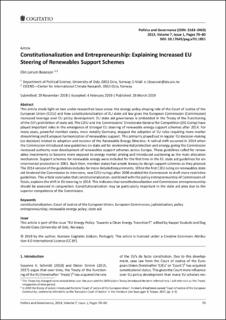Constitutionalization and entrepreneurship: Explaining increased EU steering of renewables support schemes
Journal article, Peer reviewed
Published version
Permanent lenke
https://hdl.handle.net/11250/2759771Utgivelsesdato
2019Metadata
Vis full innførselSamlinger
- Journal articles [478]
Sammendrag
This article sheds light on two under-researched issue areas: the energy policy-shaping role of the Court of Justice of the European Union (CJEU) and how constitutionalization of EU state aid law gives the European Commission (Commission) increased leverage over EU policy development. EU state aid governance is embedded in the Treaty of the Functioning of the EU’s prohibition of state aid. The CJEU and the Commissions’ Directorate-General for Competition (DG Comp) have played important roles in the emergence of stronger EU steering of renewable energy support schemes after 2014. For many years, powerful member states, most notably Germany, stopped the adoption of EU rules requiring more market streamlining and European harmonization of renewables support. This primarily played out in regular EU decision-making (co-decision) related to adoption and revision of the Renewable Energy Directive. A radical shift occurred in 2014 when the Commission introduced new guidelines on state aid for environmental protection and energy, giving the Commission increased authority over development of renewables support schemes across Europe. These guidelines called for renew ables investments to become more exposed to energy market pricing and introduced auctioning as the main allocation mechanism. Support schemes for renewable energy were included for the first time in the EU state aid guidelines for en vironmental protection in 2001. Back then, member states had ample leeway to design support schemes as they pleased.
The 2014 version of the guidelines includes far more detailed requirements. While the first CJEU ruling on renewables state aid hindered the Commission to intervene, new CJEU rulings after 2008 enabled the Commission to draft more restrictive guidelines. This article concludes that constitutionalization, combined with the policy entrepreneurship of Commission of ficials, explains the shift in EU steering in 2014. This indicates that constitutionalization and Commission entrepreneurship should be assessed in conjunction. Constitutionalization may be particularly important in the state aid area due to the superior competence of the Commission
